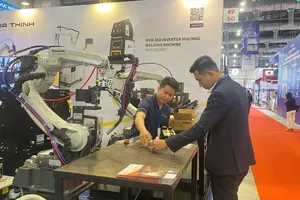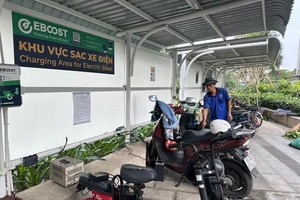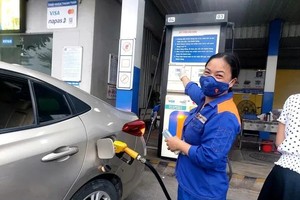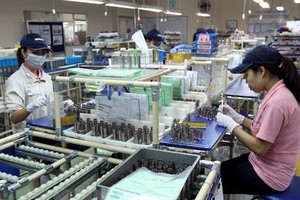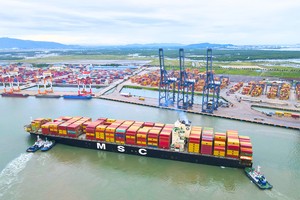 |
Production at a company in HCMC. (Photo: SGGP) |
The recently released 2022 Provincial Competitiveness Index (PCI) report by the Vietnam Chamber of Commerce and Industry (VCCI) presents a concerning snapshot of the business and investment climate, with the PCI considered as a mirror reflecting the health of localities' investment and business environments.
Several localities experience a drop in their PCI rankings
The 2022 PCI report gathers input from 11,872 enterprises, including 10,590 private companies and 1,282 foreign direct investment (FDI) enterprises operating in Vietnam. The report ranks Quang Ninh, Bac Giang, Hai Phong, Ba Ria - Vung Tau, and Dong Thap as the localities with the highest quality of economic management among the 63 provinces and cities evaluated in the report. Quang Ninh has topped the PCI rankings for the sixth time, with a score of 72.95 out of 100, followed by Bac Giang with 72.80 points.
The PCI 2022 report also reveals the drop in rankings of several localities, including major centrally-run cities that were previously seen as driving forces of the economy, such as Hanoi (falling from 10th place in 2021 to 20th place) and Da Nang (dropping from 4th place in 2021 to 9th place).
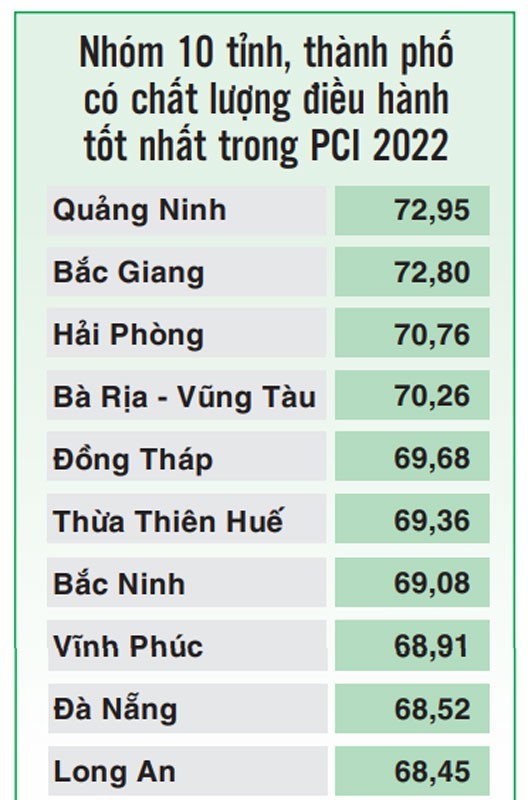 |
PCI rankings of localities. (Photo: SGGP) |
One notable finding from the PCI 2022 report is the significant drop in Ho Chi Minh City's ranking, which fell 13 notches from 14th place in 2021 to 27th place in 2022. Despite this decline in overall competitiveness, the city still holds a place in the top ten localities rated by FDI enterprises as having a favorable investment environment.
This highlights the commendable endeavors of HCMC in enhancing the environment to attract and retain foreign businesses, particularly in light of the Covid-19 pandemic's impact on FDI firms operating in industrial hubs in the Southeast region, like Binh Duong and Dong Nai provinces, who are exercising caution in expanding their operational footprint.
Businesses find it difficult to access loans
While the PCI 2022 results reveal that the quality of provincial governance has improved over time, with the average PCI score reaching 65.22 points - an increase for the sixth consecutive year, the report also indicates that enterprises continue to face challenges. According to the survey of over 12,000 businesses conducted by VCCI, 55.8 percent of them reported having to tip credit officers to secure loans, highlighting the difficulties enterprises face in accessing financing.
Mr. Dau Anh Tuan, Deputy Secretary General of VCCI and Director of the PCI Project, has reported that the biggest challenge facing Vietnamese private enterprises, according to the PCI 2022 survey results, is accessing credit. In fact, access to credit became the primary concern for approximately 55.6 percent of enterprises in 2022.
The PCI survey shows that the percentage of businesses accessing credit has been declining in recent years. In 2017, 49.4 percent of enterprises had loans from banks and credit institutions, but this rate dropped to 45 percent and 43 percent in 2018 and 2019, respectively. Even in 2020, amidst the Covid-19 pandemic, 42.9 percent of businesses had loans from banks and credit institutions. Shockingly, the proportion of enterprises with loans from banks and credit institutions fell to 35.4 percent in 2021 and plummeted to 17.8 percent in 2022.
The 2-percent interest rate support package, deployed through the commercial banking system to help businesses recover from the Covid-19 pandemic, was an important credit support program for businesses in 2022. However, the PCI 2022 survey results indicate that only 29.5 percent of enterprises were aware of this program, and a mere 2 percent of businesses reported receiving loans under the 2-percent interest rate support program.
HCMC identifies solutions and tasks for PCI improvement
HCMC has identified several solutions and tasks aimed at improving the PCI. Specifically, in the second quarter of 2023, the city plans to concentrate on enhancing the efficiency of public service activities, promoting administrative reform, and improving the investment environment.
 |
The beverage production line of a company in HCMC. (Photo: SGGP) |
HCMC has been planning to study and develop coordination regulations between agencies, units, and organizations for inspecting and evaluating the implementation process of the signed coordination regulations. The city will also compile problems and difficulties to report and make proposals to the competent authorities.
In addition, HCMC will issue plans to implement the District and Departmental Competitiveness Index assessment (DDCI) of HCMC in 2023 and to improve, overcome, and increase the city's PCI index in 2023. Furthermore, in April, HCMC plans to complete the project to attract foreign direct investment and social resources for transport, urban, and service infrastructure projects, as well as initiate a project to improve the efficiency of the HCMC Investment and Trade Promotion Center (ITPC).
* Mr. Hua Quoc Hung, Head of the HCMC Export Processing Zone and Industrial Park Authority: Numerous bottlenecks lead to loss of competitiveness points
Recently, the quality and efficiency of investment attraction into export processing zones and industrial parks (EPZs and IPs) have not met the requirements for in-depth development, as they have not attracted many projects with large investment capital, advanced technology, intellectual content, high added value, and widespread impact.
The development model of industrial zones has been slow to innovate, with a primary focus on multi-industry and multi-field development. Linkages and cooperation inside EPZs-IPs, between EPZs and IPs, and between EPZs-IPs and the outside world are still limited, resulting in a low level of localization and a lack of specialized industrial zones. Infrastructure serving the industrial parks is still not synchronized.
The management model under the "one-stop shop, on-site" mechanism has many shortcomings, with the position, functions, tasks, and organizational structure of the management board of IP not being clear, stable, or fully decentralized. This lack of clarity means that there are not enough legal grounds to implement the policy of administrative reform following the "one-stop shop, on-site" model of the Government.
* Economist Phan Chanh Duong, a lecturer at the Fulbright School of Public Policy and Management: Unsynchronized coordination between departments, agencies, and localities
HCMC's urban transport infrastructure is overloaded, significantly affecting the investment environment. Although administrative reform movements have been carried out by various units, their efficiency may not have been high enough to satisfy people and businesses.
Unsynchronized coordination between departments, agencies, localities, and between HCMC and ministries, departments, and agencies is also a contributing factor to these issues. If one department or agency is sluggish or delayed, it can cause bottlenecks in the entire process. Furthermore, businesses still face many sunk costs and additional costs that add to their burden.
Addressing these issues is crucial for improving the investment environment and raising the PCI in HCMC.
* Mr. Nguyen Ngoc Hoa, Chairman of HCMC Union of Business Association (HUBA): Drastic measures needed to streamline administrative procedures
Despite efforts to reform administrative procedures in recent years, HCMC still falls short of meeting the demands of the business community. Therefore, the city must continue to prioritize discipline, administrative reform, and streamlining administrative procedures to create a favorable environment for businesses to thrive.
Another issue is that the implementation procedure for construction investment projects is currently overly complicated due to the reluctance of certain agencies to take responsibility and the lack of enthusiasm among officials and civil servants. The most problematic procedures include those related to land use plans, investment policy grants, investment certificate issuance, and construction permits. As a result, the HUBA suggests that the city conduct a review and promptly address these issues.












